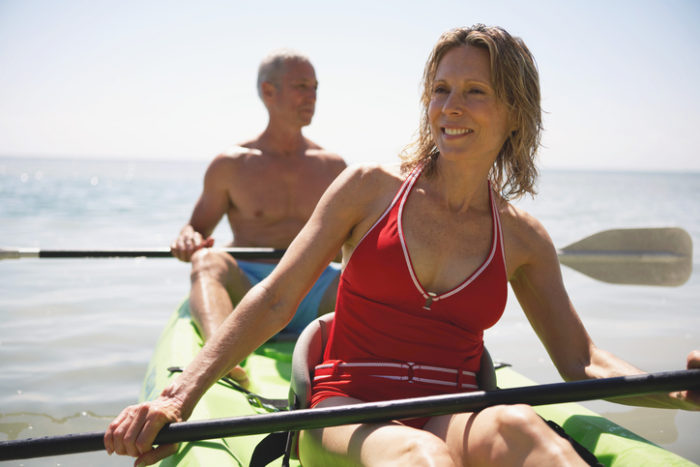

You don’t have to become weaker and less athletic as you age. With the right kind of fitness routine, mindset, and effort, you can continue to feel athletic, flexible, and strong well into your eighties (and maybe even beyond!).
Declining fitness and muscle mass are, sadly, a part of aging. After age 30, you can lose anywhere between three and five percent of your total muscle mass every decade. And according to Harvard, most men will lose 30 percent of their muscle mass within their lifetimes. That’s probably why many of us associate aging with weakness, but it doesn’t have to be that way.
Take this 106 year-old Frenchman, for example. Robert Marchand can still race on a bike at 14 miles in an hour, which is pretty impressive considering that is the average speed for a fit commuting cyclist. Marchand is over a century old and as fit as most roadside riders a fraction of his age!
Don’t let your age dictate your fitness level. Here are a few tips to keep you fit and feeling great well past 30.
Prioritize plant proteins.
If you are looking to hold on to muscle mass as you age, consuming lots of plant foods is important–especially plant-based proteins. Amino acids are the building blocks of proteins, and our muscles are built out of amino acids.
Research has shown that long-term amino acid supplementation can actually prevent age-related muscle loss. So getting plenty of those amino acids into your diet via plant-based protein is important as you get older.
Of course, that doesn’t mean you need to start chugging protein shakes. But making sure each meals contains a healthy dose of plant-based protein is a great way to get a leg up and maintain your muscle mass.
If you need to beef up on your plant-based protein knowledge, try adding these 25 vegan protein sources to your diet.
Keep it simple and strong.
As fitness technology advances, it may be tempting to rely on watches and tablets and alerts to tell you how to work out. Don’t get swept up in the gadgetry. Instead, focus on the basics.
Strength training is crucial to continue as you age, even if it is just bodyweight training. The muscles that stabilize your joints are especially important to keep strong.
Focusing on using the muscles around your hips, knees, and shoulders can pay off big time in avoiding replacements down the line. Do bodyweight exercises like planks, try gardening, and try taking up training regimens like boxing or climbing to encourage a full body strength workout.
Find an activity you are passionate about.
If you don’t like working out, you’ll never do it. The key to maintaining your fitness level is to find something fun and active that you actually want to do. That might be kayaking, playing tennis, dancing, yoga, road biking, or something else.
Having a healthy relationship with fitness is important if you want to keep your body healthy and strong as you age. It shouldn’t feel like a chore. Our bodies are made to move.
Keep walking.
Walking is one of the most natural movements we can do, but modern life is encouraging us to do less and less of it. Don’t become complacent.
Walking reduces your risk of disease, supports a healthy bodyweight, can ease joint pain, and even boosts immune function. Make sure to get outside and walk for at least 30 minutes every day to support heart health and retain bone density and muscle mass.

Don’t push it.
As you age, you need to emphasize rest. The secret to fitness isn’t just pushing, pushing, pushing. Even elite athletes prioritize rest as part of training.
The secret to fit aging is to strike that perfect balance between activity and recovery. Even athletic gods like Roger Federer need to rest. Take a page out of their books and don’t go overboard on the intense workouts. Schedule rest days and get plenty of sleep.
Don’t forget your mind.
Exercising your mind is just as important as exercising your body. Keeping your brain active prevents mental degeneration and promotes an increase in gray matter. Try a daily puzzle and incorporate workouts that involve focus and mental skills, like rock climbing or tennis.
Aging doesn’t have to be a sentence to weakness and inactivity. You can still live your life and be as active and athletic as you were in your youth. It just takes a little dedication and self-awareness to stay fit, healthy, and avoid injury–even over age 100.
What sort of exercise do you get excited about? Do you find it more challenging to stay fit as you age? Share your experiences in the comments below.
Related on Care2
Images via Thinkstock.
more recommended stories
 Fentanyl Seizures at Border Continue to Spike, Making San Diego a National Epicenter for Fentanyl Trafficking
Fentanyl Seizures at Border Continue to Spike, Making San Diego a National Epicenter for Fentanyl TraffickingFentanyl Seizures at Border Continue to.
 Utah Man Sentenced for Hate Crime Attack of Three Men
Utah Man Sentenced for Hate Crime Attack of Three MenTuesday, August 8, 2023 A.
 Green Energy Company Biden Hosted At White House Files For Bankruptcy
Green Energy Company Biden Hosted At White House Files For BankruptcyAug 7 (Reuters) – Electric-vehicle parts.
 Former ABC News Reporter Who “Debunked” Pizzagate Pleads Guilty of Possessing Child pδrn
Former ABC News Reporter Who “Debunked” Pizzagate Pleads Guilty of Possessing Child pδrnFriday, July 21, 2023 A former.
 Six Harvard Medical School and an Arkansas mortuary Charged With Trafficking In Stolen Human Remains
Six Harvard Medical School and an Arkansas mortuary Charged With Trafficking In Stolen Human RemainsSCRANTON – The United States.
 Over 300 People Facing Federal Charges For Crimes Committed During Nationwide Demonstrations
Over 300 People Facing Federal Charges For Crimes Committed During Nationwide DemonstrationsThe Department of Justice announced that.
